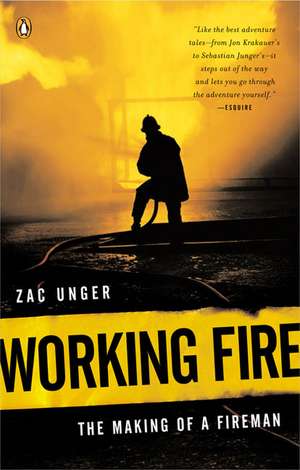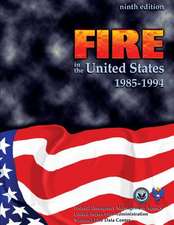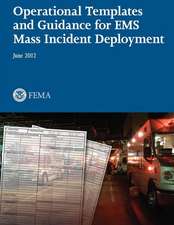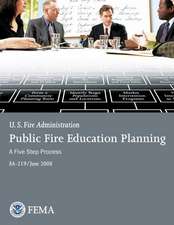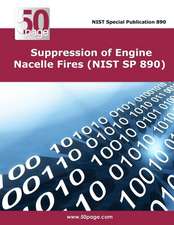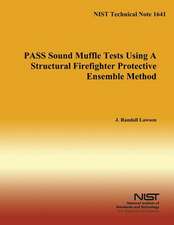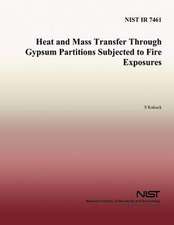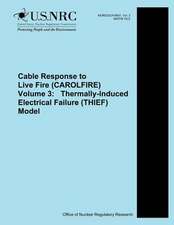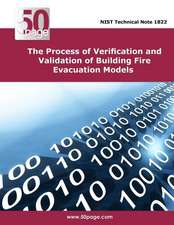Working Fire: The Making of a Fireman
Autor Zac Ungeren Limba Engleză Paperback – 31 ian 2005 – vârsta de la 18 ani
Vezi toate premiile Carte premiată
Zac Unger didn’t feel like much of a fireman at first. Most of his fellow recruits seemed to have planned for the job all their lives; he was an Ivy League grad responding to an ad at a bus stop. He couldn’t keep his boots shined, and he looked terrible in his uniform. Working Fire is the story of how, from this unlikely beginning, Zac Unger came to feel at home among this close-knit tribe, came to master his work’s demands, and came to know what it is to see the world through a firefighter’s eyes. From the raw material of his days’ work—alarm calls both harrowing and hilarious, moments of triumph and grief—Unger has forged a timeless story of finding one’s path, and a rousing adventure about the bravery and sacrifice of everyday heroes.
On the web: http://www.zacunger.com
On the web: http://www.zacunger.com
Preț: 132.57 lei
Nou
Puncte Express: 199
Preț estimativ în valută:
25.37€ • 26.39$ • 21.23£
25.37€ • 26.39$ • 21.23£
Carte disponibilă
Livrare economică 22 februarie-08 martie
Preluare comenzi: 021 569.72.76
Specificații
ISBN-13: 9780143034957
ISBN-10: 0143034952
Pagini: 272
Ilustrații: b/w illustrations on frontispiece
Dimensiuni: 141 x 214 x 15 mm
Greutate: 0.25 kg
Editura: Penguin Books
ISBN-10: 0143034952
Pagini: 272
Ilustrații: b/w illustrations on frontispiece
Dimensiuni: 141 x 214 x 15 mm
Greutate: 0.25 kg
Editura: Penguin Books
Recenzii
"An inside view of firefighting that vividly re-creates the excitement and fear intrinsic to it." —The Washington Post
"Filled with revelatory nuggets... that refreshingly humanize these courageous warriors." —Entertainment Weekly
"Filled with revelatory nuggets... that refreshingly humanize these courageous warriors." —Entertainment Weekly
Notă biografică
Zac Unger is a firefighter and paramedic in Oakland, California. He has written about his life and work for the online magazine Slate. He is a graduate of Deep Springs College, Brown University, and UC Berkeley.
On the web: http://www.zacunger.com
On the web: http://www.zacunger.com
Extras
In my first months it was all pole. I couldn’t imagine taking the stairs like most of the old-timers. For me the pole stood for everything I admired about the fire department—speed, daring, an ageless tradition offered to only a select few. After dark I would lie in my bunk, fully dressed and vibrating with energy, waiting wide eyed for a call to come in. During my first months at the firehouse, I refused to let myself sleep, fearful that I’d somehow miss the cascading bells and harsh fluorescent lights that erupt when an alarm comes in. When the bells went off, I’d go flying out of my bunk and hit the pole running, spin down to the ground floor, spring into the rig, and wait. Within thirty seconds—it seemed like an eternity—the others would arrive at the rig, snapping their suspenders into place, kicking sleepy kinks out of their knees. The officer would key the mike to tell dispatch that we were leaving, then flick a match to his cigarette and settle into his seat. We’d race through darkened streets, the officer’s tobacco smoke curling back to where I sat fumbling with my heavy coat and gloves. Usually we’d leave the sirens turned off, and I’d watch our progress in the blinking lights playing on the shuttered shop windows and the huddled bodies of men sleeping in doorways. There was no good reason to wake them up.
“Confirming stills. Confirming stills.” The voice of a female dispatcher crackles over the radio, telling us that it’s likely to be a real fire this time, not just one of our many false alarms. If more than one person calls it in, the flames are apt to be big and showy. They call it a “still” because when the information comes over the firehouse loudspeaker, conversations die in midair, the clink of coffee cups goes silent, and every fireman holds his breath, hoping that the address is in his district and he’ll get to fight a fire. That’s the only time a fireman is ever still. A “confirming still” means that the fire is big enough to have attracted attention from several people, all of whom called in to 911 simultaneously.
With the confirmation, the officer stubs out the cigarette on the side of his boot and rolls down the window, sniffing for smoke on the quiet summer air. He flips on the siren now, and I hear it echoed by other distant fire engines triangulating their way toward us. “I’m not smelling it yet. You smell anything?” he asks.
“Nope,” says Jack Alvarez, the firefighter sitting beside me. “Probably ain’t shit.” He’d been sleeping, bent forward in his seat, his head resting in the cup of his hands. I didn’t see him put the plug of tobacco into his lower lip. Maybe he goes to bed with it already in place. He rouses himself and slips fluidly into his turnout coat, buckling it over his thick cotton sweatshirt, the one with the logo of a grinning clown holding a fireman’s ax. He crosses himself, then kisses his wedding ring, and I make a mental note to develop a ritual for myself, some sort of secular facsimile of prayer that I can use before I go running into a burning building.
“Aw, hell. We’ll see it when we get there.” The officer rolls up his window and shakes a fresh cigarette out of the package. Alvarez clips the last buckle on his air bottle and then settles his head back down into his hands and closes his eyes.
We turn the last corner, and we’re right on top of it. The building on fire is a classic “taxpayer”-type structure, meaning it has apartments on the upper floors and shops at street level. Fire runs the length of the ground floor, shooting out of plate-glass windows shattered by the heat. Alvarez claps his gloved hands and howls like a kid on a roller coaster. Engine Fifteen is already on the scene, and they’ve hooked a hydrant and laid a big-line supply hose clear across the middle of the intersection. What few cars are out at midnight on a Tuesday are driving right over the hose as if they can’t see our flashing lights. It’s not the first fire I’ve been to in my few weeks on the job, but I can tell that it’s going to be the best one yet.
Truck Four pulls up at the same time we do, slaloming into position nose to nose with our engine. The guys are off the rig before it comes to a stop, and they go to work in a blur. It’s hard not to watch, not to be so impressed by the coordinated aggression of the scene that I forget to do my own job.
The truckies start working on the building’s front door, a big roll-up made of corrugated metal. The first guy to the door reaches high above his head and buries a whirring circular saw in the metal, throwing sparks in every direction. He draws the saw down to the ground, then starts again from the top. When he finishes, another fireman gives the door a backward mule kick and a large triangular cutout falls away into the smoky darkness, opening up a new hole to enter through. Ladders slam against the side of the building, and men run up the rungs and disappear over the lip of the roof parapet.
The first-in crew has an attack line in place, charged with water and ready to go, and they move inside as soon as the door is cut open. They’re going inside to find the seat of the fire, the root of the flames. Spraying water through the window won’t do anything but keep the fire from spreading to the next building over. To actually put something out and keep a building from burning to the ground, you have to go inside.
“Confirming stills. Confirming stills.” The voice of a female dispatcher crackles over the radio, telling us that it’s likely to be a real fire this time, not just one of our many false alarms. If more than one person calls it in, the flames are apt to be big and showy. They call it a “still” because when the information comes over the firehouse loudspeaker, conversations die in midair, the clink of coffee cups goes silent, and every fireman holds his breath, hoping that the address is in his district and he’ll get to fight a fire. That’s the only time a fireman is ever still. A “confirming still” means that the fire is big enough to have attracted attention from several people, all of whom called in to 911 simultaneously.
With the confirmation, the officer stubs out the cigarette on the side of his boot and rolls down the window, sniffing for smoke on the quiet summer air. He flips on the siren now, and I hear it echoed by other distant fire engines triangulating their way toward us. “I’m not smelling it yet. You smell anything?” he asks.
“Nope,” says Jack Alvarez, the firefighter sitting beside me. “Probably ain’t shit.” He’d been sleeping, bent forward in his seat, his head resting in the cup of his hands. I didn’t see him put the plug of tobacco into his lower lip. Maybe he goes to bed with it already in place. He rouses himself and slips fluidly into his turnout coat, buckling it over his thick cotton sweatshirt, the one with the logo of a grinning clown holding a fireman’s ax. He crosses himself, then kisses his wedding ring, and I make a mental note to develop a ritual for myself, some sort of secular facsimile of prayer that I can use before I go running into a burning building.
“Aw, hell. We’ll see it when we get there.” The officer rolls up his window and shakes a fresh cigarette out of the package. Alvarez clips the last buckle on his air bottle and then settles his head back down into his hands and closes his eyes.
We turn the last corner, and we’re right on top of it. The building on fire is a classic “taxpayer”-type structure, meaning it has apartments on the upper floors and shops at street level. Fire runs the length of the ground floor, shooting out of plate-glass windows shattered by the heat. Alvarez claps his gloved hands and howls like a kid on a roller coaster. Engine Fifteen is already on the scene, and they’ve hooked a hydrant and laid a big-line supply hose clear across the middle of the intersection. What few cars are out at midnight on a Tuesday are driving right over the hose as if they can’t see our flashing lights. It’s not the first fire I’ve been to in my few weeks on the job, but I can tell that it’s going to be the best one yet.
Truck Four pulls up at the same time we do, slaloming into position nose to nose with our engine. The guys are off the rig before it comes to a stop, and they go to work in a blur. It’s hard not to watch, not to be so impressed by the coordinated aggression of the scene that I forget to do my own job.
The truckies start working on the building’s front door, a big roll-up made of corrugated metal. The first guy to the door reaches high above his head and buries a whirring circular saw in the metal, throwing sparks in every direction. He draws the saw down to the ground, then starts again from the top. When he finishes, another fireman gives the door a backward mule kick and a large triangular cutout falls away into the smoky darkness, opening up a new hole to enter through. Ladders slam against the side of the building, and men run up the rungs and disappear over the lip of the roof parapet.
The first-in crew has an attack line in place, charged with water and ready to go, and they move inside as soon as the door is cut open. They’re going inside to find the seat of the fire, the root of the flames. Spraying water through the window won’t do anything but keep the fire from spreading to the next building over. To actually put something out and keep a building from burning to the ground, you have to go inside.
Descriere
This remarkable memoir, by turns funny and deeply moving, explores one man's coming into his calling and his transformation from ambivalent Ivy League grad to skilled and dedicated firefighter.
Premii
- Eliot Rosewater Indiana High School Book Award Nominee, 2006
- Virginia Readers Choice Award Nominee, 2008
